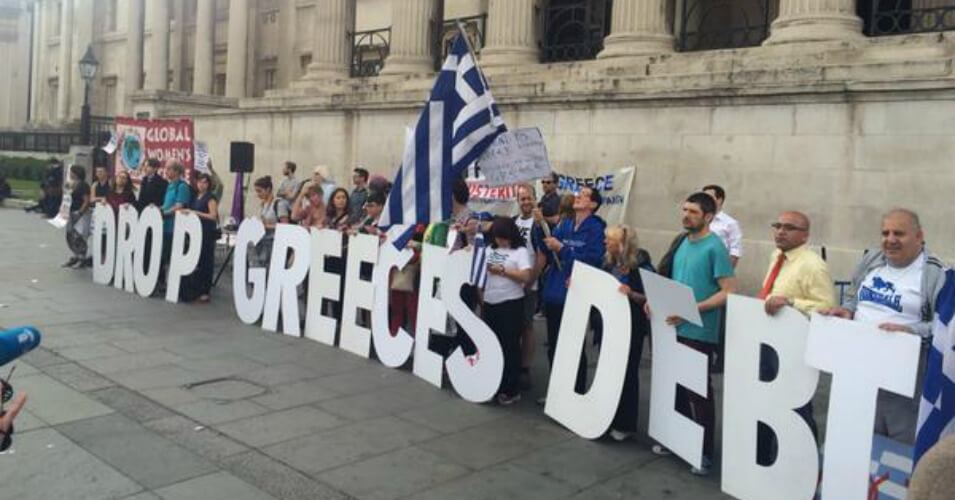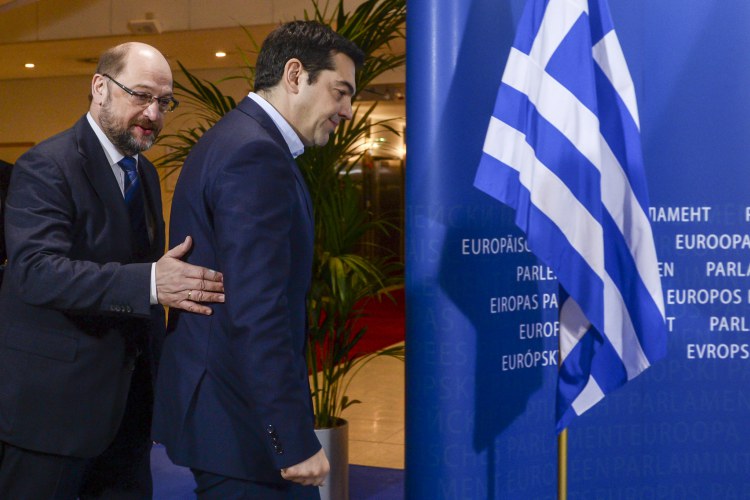“The issue is whether a break (of Greece) with Europe would make things better (for Greece). And that is an issue that has to be worked out by Greeks”.
This is the opinion of the internationally-renowned Keynesian economist James Galbraith, answering questions by Greek journalist and writer Dimitris Konstantakopoulos.
A friend of and advisor to the Greek Finance Minister Yanis Varoufakis, the chief Athens negotiator with the Creditors in 2015, Galbraith is the author of a book, published last year: “Welcome to the Poisoned Chalice: The Destruction of Greece and the Future of Europe”.
James Galbraith is also a professor at the Lyndon B. Johnson School of Public Affairs and at the University of Texas at Austin and a Senior Scholar with the Levy Economics Institute and part of the executive committee of the World Economics Association. In his interview he speaks also about Trump economics, the transatlantic relationship and the future of dollar.
D.K.You were quite involved in the Greek problems, with both Papandreou and Tsipras governments and you published a book last year on those experiences. Now Greece is always facing the same problems. Probably the German Finance Minister wants it out of the Eurozone and some people wonder that if the Trump administration is not also opting for such an issue. What is your opinion? What Greece should do? In which way you believe it can ameliorate its position, either remaining or leaving the Eurozone?
J.G. Clearly the new administration has no great respect for the European Union, and no special interest in the Euro. I doubt that they have a clearly-thought-out strategy for Greece, at this stage, although the President made his personal views on Greece and the euro clear enough some years back. (Thinking things through is not, so far as I can tell, one of the strengths of the new administration in general.)
As for my personal view, it has always been the same: Greece is caught in a terrible trap of destructive policies that have nothing to do with fostering a stronger economy or a better life in Greece. The issue is whether a break with Europe would make things better. And that is an issue that has to be worked out by Greeks.
D.K. Deception seems to have become one of the main methods of politics in our days. “Socialists” destroy societies, “nationalists” nations. Do you think Trump will do what he promised or the opposite?
J.G.Nicely put. So far, the Trump method in government appears to be very similar to his method in business; to summarize in one word, it is: exaggeration. The early actions of the administration claim to have accomplished much more than they actually did, and where they had drastic effects — such as the travel ban — we discovered that the public is not asleep and the courts still function, up to a point. How things will develop over time remains to be seen.
D.K. Is Trump representing a new economic and political “paradigm”? What is your own positioning towards such a “paradigm”?
J.G. The administration is a jumble of reactionary ideologues, big business types with no experience in government, and military officers who (one hopes) have acquired some habits of pragmatism and caution. Trump himself expresses some of each tendency. If there is a unifying theme, it is a general rejection of rule by entitled professionals, among them lawyers, scientists, but also perhaps especially economists, who the public rightly suspects of having greatly overstated the value of their insights. A rebellion, in short, against what Milovan Djilas long ago described as the “New Class.”
My own positioning is of minor interest, but let me put it this way. I long ago detached myself from participation in the professional ruling class, precisely because the separation of interests between that class and those of the ordinary working population was too much to stomach. But of course the turn of working class voters toward the leadership of reactionary ideologues is a tragedy.
D.K. Trump has launched an all out attack against the EU. Is it just shock tactics, or he really aims at its destruction? How Europe should react to that?
J.G. Trump’s contempt for the EU is clear. Is this an all-out attack? Hard to say; I’m far from being privy to the inner thoughts of the Trump White House. But based on the public record, Europeans should recognize that the new US government apparently does not expect Europe to follow any interest but its own, and this is a remarkable shift in perspective — one which is having interesting psychological effects on the foreign policy community here.
That being so, Europe needs to work out what its independent interests are. My views remain aligned with those of the DiEM25 movement: it would be best for Europe to develop democratic and accountable institutions at the European level, along with comprehensive change in economic policy. This is a tall order, to be sure, and maybe impossible. But the alternative of a general crack-up seems, to me, very unappealing,
D.K. We have seen calls for a new protectionism but, in the same time, levering of any barriers to the activity of Finance. Is it possible to combine protectionism and financial globalization?
J.G. No. At least, not so far as I can tell. It seems that the new American government has not thought this through, and the likely consequence will be that the protectionist initiatives will be vitiated by financial globalization — specifically in the first place by the rising dollar. I will be writing on this in detail for an economics journal.
D.K. Some people believe we already reached the physical limits of the development of productive forces and, in the same time, we have already acquired what we need in order to satisfy “reasonable human needs”. Would you agree? If this is true, then maybe “disaster capitalism” cannot be explained as coming to fulfill an objective need, in the way wars have done it in the past, by destroying productive forces? What could be the alternative model to both “globalization” and “nationalistic” forms of neoliberal turning into disaster capitalism?
J.G. As a pure matter of productive capacity, we arrived long ago at the point where basic human needs and the requirements of decent civilized life could be satisfied for most people, given proper social and political arrangements. Capitalism has, however, always fostered competitive combats and struggles for the acquisition and display of wealth and power; it is about status relations, not material comforts. Working out an alternative has, in the past generation, become more urgent than ever before, given the ecological limits that were not previously acknowledged.
D.K. What do you believe about the future of US dollar, Euro or other potential alternatives as world reserve money?
J.G. For the moment, I believe the great maxim of Count Otto von Bismarck still holds, that the Almighty Providence looks after fools, drunks and the United States of America. So for the near future, the dollar will remain where it is. The fate of the Euro will be decided by the politics of Europe.
D.K. Why this international campaign to ban cash?
J.G. This is very simple: transactions not based on cash pass through banks, which is something banks like very much. That is why the idea of a public electronic exchange platform is a good one, as it would combine the convenience of electronic transactions with the very low overhead cost of cash. Reducing the role and power of private commercial banks is an essential element of any serious program of political reform.
For instance there is a DiEM proposal, a way to redevelop the banking sector and get it out of the hands of the big private multinational banks. Historically close to European practice, particularly as in France, described long ago in https://babel.hathitrust.org/cgi/pt?id=pur1.32754076926819;page=root;seq=1;view=2up;size=100;orient=0











